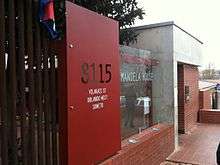Benedict Wallet Vilakazi
| Benedict Wallet Vilakazi | |
|---|---|
| Born |
6 January 1906 KwaDukuza, Natal |
| Died |
26 October 1947 (aged 41) Johannesburg, South Africa meningitis |
| Nationality | South Africa |
| Fields | Poet, linguists |
| Institutions | University of Witwatersrand |
| Alma mater |
University of South Africa University of Witwatersrand |
| Thesis | 'Oral and written literature in Nguni.[1] |
| Doctoral advisor | CM Doke |
Benedict Wallet Vilakazi (6 January 1906 – 26 October 1947) was a South African Zulu poet, novelist, and educator. In 1946, he became the first black South African to receive a Ph.D.[2] Vilakazi Street in Soweto is named after him and it is now famous as the place where both Nelson Mandela and Desmond Tutu once lived.
Biography
Benedict Vilakazi was born Bambatha kaMshini in 1906 at the Groutville Mission Station near KwaDukuza, Natal (now South Africa), the fifth child of Christian converts Mshini ka Makhwatha and Leah Hlongwane, Mrs Leah Hlongwane Vilakazi daughter to Bangile who is sister to Queen Ngqambuza wife to Mpande ka Cetshwayo. Leah who is Sister to RT Rev j Mdelwa Hlongwane ka Mnyaziwezulu who is the son of chief matiwane . Vilakazi split his childhood between herding the family cattle and the local mission school until the age of 10, at which point he transferred to St. Francis College, Mariannhill, a Roman Catholic monastery. Here he was baptized with the name "Benedict Wallet," though at his mother's insistence he kept the family name of Vilakazi. He obtained a teaching certificate in 1923 and taught at Mariannhill and later at a seminary in Ixopo.
In 1933, Vilakazi released his first novel Nje nempela ("Really and Truly"), one of the first works of Zulu fiction to treat modern subject matter. He followed it in 1935 with the novel Noma nini as well as a poetry collection Inkondlo kaZulu, the first publication of Western-influenced Zulu poetry.

Earning a B.A. from the University of South Africa in 1934, Vilakazi began work in the Bantu studies department at the University of Witwatersrand in 1936 under linguist C. M. Doke, with whom he created a Zulu-English dictionary. Vilakazi's teaching position made him the first black South African to teach white South Africans at the university level.
Vilakazi's later novels continued to explore daily Zulu life, such as UDingiswayo kaJobe (1939) and Nje nempela (1944), the story of a traditionally polygamous household. His poetry, heavily influenced by European Romantic styles, fused rhyme and stanza forms previously unknown in Zulu with elements of the izibongo, traditional praise poetry. His poetry became increasingly political in the course of his life, dramatizing the exploitation of not only the Zulus but of black Africans generally. Both his novels and poetry were well received in his own lifetime and remain so today.
Vilakazi is also noted for his scholarly work on oral tradition and the Zulu and Xhosa languages, which on 16 March 1946, earned him the first Ph.D. to be won by a black South African. He died the following year in Johannesburg of meningitis.
On 28 April 2016, the Order of Ikhamanga - Gold (OIG) was conferred on Dr Benedict Wallet Vilakazi posthumously‚ for "his exceptional contribution to the field of literature in indigenous languages and the preservation of isiZulu culture".[3]
Legacy
Vilakazi Street in Soweto is the only street in the world where two Nobel Laureates once lived. It is where Nelson Mandela and Desmond Tutu once lived and it was named in honour of Vilakazi.[4]
Works
- Inkondlo kaZulu (poetry), Witwatersrand University Press (Johannesburg), 1935.
- Noma nini (novel), Yacindezelwa Emshinini Wasemhlathuzane (Mariannhill, Natal), 1935.
- UDingiswayo kaJobe (novel), Sheldon Press (London), 1939.
- Nje nempela (novel), Mariannhill Mission Press (Mariannhill, Natal), 1944.
- Amal'eZulu (poetry), Witwatersrand University Press, 1945.
- Zulu-English Dictionary (with C. M. Doke), Witwatersrand University Press, 1948.
References
- ↑ http://www.worldcat.org/title/oral-and-written-literature-in-nguni/oclc/49016978
- ↑ "Dr. Benedict Wallet Vilakazi", South African History Online.
- ↑ "President Jacob Zuma bestows 2016 National Orders Awards, 28 Apr". South African Government. 20 April 2016. Retrieved 8 May 2016.
- ↑ Vilakazi Street Sign, photo on Flickr, accessed July 2013
- Zulu Kingdom. Benedict Vilakazi - a short biography and bibliography - of this KwaZulu-Natal author.
- "Benedict Wallet Vilakazi." Contemporary Authors Online, Gale, 2003.